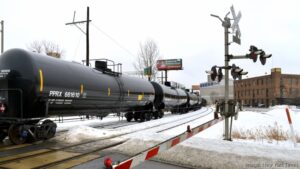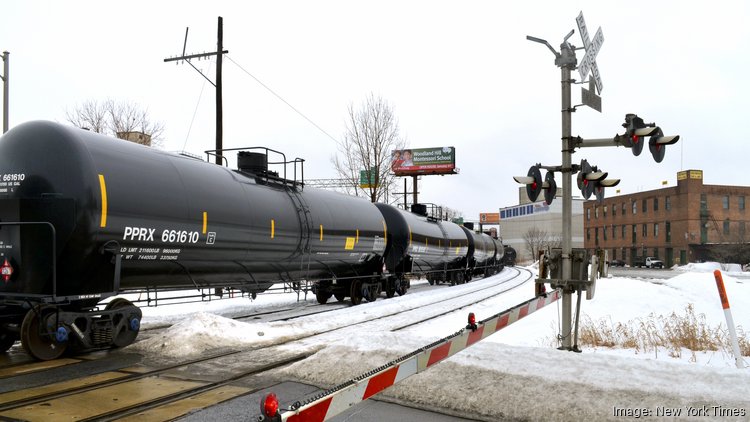Article published in the Philadelphia Business Journal on May 8, 2023.
The Pipeline and Hazardous Materials Safety Administration denied Energy Transport Solutions a special permit renewal on April 24 to haul liquified natural gas (LNG) by rail through a populated portion of eastern Pennsylvania. Energy Transport Solutions wants to transport LNG from a proposed liquefaction plant in Wyalusing, Pennsylvania, to a ship terminal in Gibbstown, New Jersey. We need to see how Energy Transport Solutions will address this roadblock.
LNG is pressurized natural gas produced from the fracking process in the Marcellus Shale region of Pennsylvania. LNG released during a derailment is not only highly flammable, but also can be explosive, risking a catastrophe to people, property and the environment.
The Gibbstown port from which the LNG would be exported overseas is located along the Delaware River just south and across from Philadelphia International Airport. A portion of the 255-mile potential rail route for these 100 car-long trains is operated by Norfolk Southern and would pass through either Philadelphia or Trenton New Jersey. One to two unit trains would make this journey every day. A derailment causing a potential breach of the rail cars and ignition of the LNG could have disastrous consequences.
There are over 1,000 train derailments each year. Fortunately, most derailments don’t impact people or the environment as seriously as the Norfolk Southern derailment that occurred in East Palestine, Ohio on Feb. 3.
The denial of the special permit renewal by the PHMSA was the right thing to do given the frequency of derailments. When the risk is small but the result of a derailment could be catastrophic, you don’t take the risk.

Shipping LNG over the road by tanker truck from Wyalusing to Gibbstown also risks a catastrophe. This 174-mile journey would require 300 to 400 tank truck shipments each day which is a huge burden on the communities through which the trucks would pass. Similar to a derailment, a tanker truck accident risks the release of flammable and explosive LNG.
The LNG to be shipped to Gibbstown is not for the domestic market, so what’s the benefit? Certainly, more exports helps the U.S. balance of trade. Building the liquefaction facility in Wyalusing provides short-term construction jobs. A small number of permanent jobs would be created operating the liquefaction plant, transporting the LNG and operating the export terminal. The risks of a catastrophic incident, however, significantly outweigh the relatively small benefits of this project.
Is there a safer way to transport LNG from Wyalusing to Gibbstown? Yes—by pipeline. It’s a huge investment, would take years to build and may not be economically feasible. Obtaining permits would be challenged by environmental groups and might never be granted.
Another pipeline company, Energy Transfer, did not distinguish itself or the pipeline industry when it “accepted criminal responsibility” for numerous violations of environmental regulations when building the Mariner East pipeline through southeast Pennsylvania. Poor management by Energy Transfer would be used by environmentalists to oppose new pipeline construction.
The Fraiser Institute reports that transport by rail results in about 4.5 times as many accidents as transport by pipeline. Those who object to building more pipelines in the U.S. don’t realize our economy relies on them. According to the U.S. Energy Information Administration, there are about three million miles of natural gas pipelines in our country, as shown in the graphic at this link.
How will this Energy Transport Solutions project play out? Time will tell. Quoting Ian Jefferies, CEO of the American Association of Railroads, “Even one incident can have a dramatic impact on a community, and as an industry that operates within communities throughout the country, we take that responsibility incredibly seriously.” Hopefully, all parties involved in this project, regardless of the mode of transport, share the same sentiment.
Stan Silverman is founder of Silverman Leadership and author of “Be Different! The Key to Business and Career Success.” He is also a speaker, advisor and widely read nationally syndicated columnist on leadership. He can be reached at Stan@SilvermanLeadership.com.

